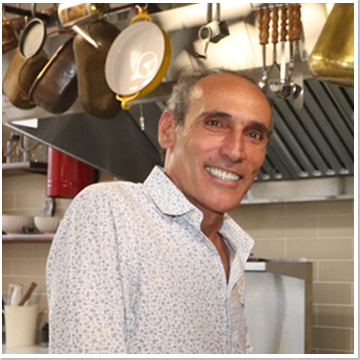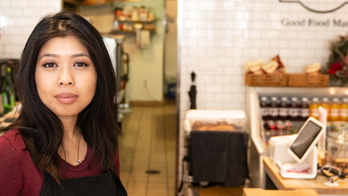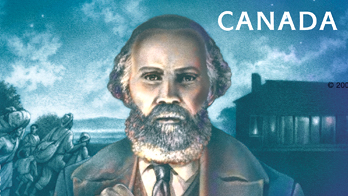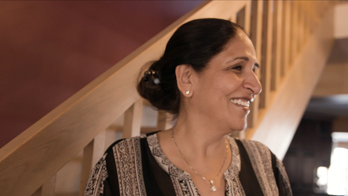Steve Kidron, who once struggled to feed himself, now runs an enterprise in Toronto that supports food industry start-ups and feeds others.
#ImmigrationMatters in Toronto, Ontario - Cooking up a community—and feeding it
Cooking up a community—and feeding it
July 16, 2019
Share:

Steve Kidron at Kitchen 24.
When Steve Kidron arrived in Toronto from Israel in 1990, he had $100 in his pocket and spoke only a few words of English. Life was a struggle as he searched for odd jobs and places to stay. However, he gradually earned enough money to buy a van and was eventually hired by a grocery store to dispose of food items nearing expiry. This job inspired him to create Kitchen 24, a thriving social enterprise and community hub.
When Steve was starting out in Canada, he was sometimes homeless and often hungry. Watching supermarkets dispose of edible food touched him personally, and it gave him an idea. He offered to buy the food from the grocery store at a reduced cost, and then, instead of dumping it, he arranged with others in the food industry to turn it into nutritious, low-cost meals for people in difficult circumstances.
Steve soon had more food coming in than he could handle, so he opened a catering service and began making meals for shelters and community centres. He was soon contacted by a fledgling food business about renting out his kitchen, and he quickly learned of the considerable demand for rentable kitchen space. The idea for Kitchen 24 began to take shape. Steve opened it with his partner, Alexandra Pelts, at the end of 2017.
Kitchen 24 includes a kosher kitchen that can deliver meals to seniors; that’s unique in Toronto. The scale of meals they provide to folks who don’t have another option for a holiday meal is amazing.
Kiera Toffelmire, Senior Manager, Programs and Community Relations, Second Harvest Food Rescue
Today, Kitchen 24 is a sizable food incubator used by culinary students, caterers and chefs trying out new menu items. The space encompasses 28,000 square feet and includes kitchens, classrooms, a boardroom, a lounge, a photo studio, and an office and event space. With 60 individual workstations, the kitchen can accommodate up to 100 people.
“Kitchen 24 is an incredible community,” says client Lori Sroujian, “Steve is making it possible for young entrepreneurs to enter the food industry without the high barriers they would normally face.” Entrepreneurs are also provided with opportunities for networking, mentoring and community support, including guidance on topics like marketing, packaging and business planning.
In 2018, Kitchen 24 hosted a gourmet Thanksgiving dinner for 200 newly arrived refugees and homeless people. Member chefs volunteered their time and cooked enough for 500 people, so they were able to send meals to shelters as well. Kitchen 24 has also worked with Second Harvest Food Rescue to provide sandwiches for up to 1,800 kids per day in summer camps. Last Christmas, Kitchen 24 served more than 2,500 meals.
“Steve is amazing and very passionate, not just about food, but also about how to help people learn the food business,” says Lola Adeyemi of It’s Souper, a client of Kitchen 24.
Above all, Steve wants Kitchen 24 to reach people who just need someone to take a chance on them.
Immigration profile: Toronto, Ontario (Census Metropolitan Area)
Quick facts:
- Immigrants in the Toronto area make up 46% of the population.
- Between 1980 and 2016, half of all immigrants who came to the Toronto area were economic immigrants, 34% were sponsored by family and 15% were refugees.
- Throughout the country, immigrants make up 53% of business owners with paid staff in the food and beverage sector.
Did you know?
- Even though immigrants make up almost half the population of Toronto, 87% of its residents are Canadian citizens.
You may also be interested in ...
 Feeding it forward – 1 sandwich at a time
Feeding it forward – 1 sandwich at a time
The owner of a Toronto eatery offers a unique way for customers to help feed those in need and build a strong community – all for less than $4.
 Leading by example
Leading by example
This is a historical example of how Canada was built on immigration. In 1853, Abraham D. Shadd moved to Canada, where his success and influence led to opportunities for many other Black Canadians.
 Fundraising for much-needed services in Sudbury
Fundraising for much-needed services in Sudbury
Inspired by her mother’s example, Bela Ravi works tirelessly to raise funds for what people need most in her home town of Sudbury.
Page details
- Date modified:




